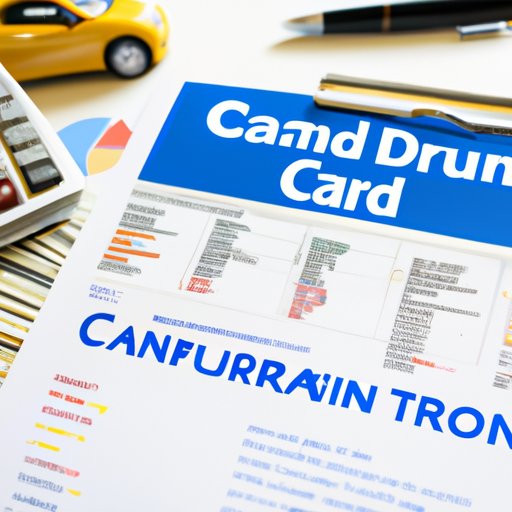Introduction
If you’re in the market for a new vehicle, you may be wondering what goes into car dealership financing. How do they decide whether or not to approve your loan and determine the associated interest rate? The answer is that there are several criteria used to evaluate potential customers and determine the best financing options.
Car financing is defined as obtaining money or credit to purchase a vehicle. This can be done through a variety of methods, such as personal loans, dealer financing, or manufacturer-backed loan programs. The goal is to secure the best possible loan terms and lowest interest rate.
In this article, we’ll explore how car dealerships determine financing and provide tips for getting the best deal. We’ll discuss topics such as analyzing credit scores, looking at different lending sources, understanding interest rates, and more.

Analyzing Credit Scores to Determine Financing
One of the most important factors in car dealership financing is your credit score. Your credit score is a three-digit number that lenders use to assess your creditworthiness. It’s based on information from your credit report, including payment history, credit utilization ratio, and length of credit history.
Car dealerships use credit scores to determine your eligibility for financing and the interest rate they will offer. Generally, the higher your credit score, the lower your interest rate and the better your chances of getting approved. If your credit score is too low, you may be denied financing or offered an unfavorable interest rate.
The impact of a low credit score on car dealership financing can be significant. For example, if you have a credit score of 600, you may only qualify for a loan with a high interest rate, whereas someone with a credit score of 700 might qualify for a much lower rate.
Exploring Different Lending Sources for Car Financing
When it comes to car dealership financing, there are several different types of lenders to consider. Bank and credit union loans are one option, as are private lenders and manufacturer-backed loan programs. Each type of lender has its own set of criteria for approving loans and determining interest rates.
Bank and credit union loans are usually the most affordable option, as they tend to offer the lowest interest rates. However, they may also require higher credit scores and longer repayment periods than other types of loans. Private lenders, on the other hand, often have more flexible requirements but may charge higher interest rates.
Manufacturer-backed loan programs are another option. These programs are designed to help customers finance vehicles from specific manufacturers. They may offer lower interest rates than other lenders, but they may also require higher credit scores and longer repayment periods.

Examining Interest Rates on Auto Loans
Interest rates are one of the most important factors in car dealership financing. The interest rate you’re offered can make a big difference in how much you pay over the life of the loan. There are several factors that affect the interest rate you’re offered, including your credit score, the loan amount, and the length of the loan.
When shopping around for car financing, it’s important to compare different lenders to get the best possible rate. Be sure to look at all the fees associated with the loan, as well as any prepayment penalties. Also, be sure to read the fine print and ask questions before signing any agreement.
Looking at Down Payment Requirements
Making a down payment is another important factor in car dealership financing. A down payment can reduce the amount of the loan and, in turn, the overall cost of the vehicle. It can also reduce the amount of interest you pay over the life of the loan.
The amount of the down payment depends on the type of loan you’re getting, as well as the lender’s requirements. Some lenders may require a certain percentage of the total loan amount as a down payment, while others may not require a down payment at all. Be sure to shop around and compare different lenders to find the best deal.
Considering Trade-In Values to Reduce Loan Amounts
If you already have a vehicle, you may be able to use it as a trade-in to reduce the amount of the loan. The trade-in value of your vehicle will depend on its condition and age. If the value of your vehicle is greater than the amount of the loan, you may be able to use it to reduce the amount you need to borrow.
When negotiating the trade-in value of your vehicle, it’s important to do your research. Look up the current market value of similar vehicles and use that as a starting point for negotiations. You may also want to consider selling your vehicle privately, as it may be worth more than the trade-in value offered by the dealership.

Understanding the Impact of Lengthy Loan Terms
The length of the loan is another important factor in car dealership financing. Longer loan terms mean lower monthly payments, but they also mean paying more in interest over the life of the loan. It’s important to weigh the pros and cons of different loan terms before making a decision.
When considering loan terms, it’s important to calculate the monthly payments to see what you can afford. If the monthly payments are too high, you may want to consider a longer loan term so you can lower the payments. However, keep in mind that this will also increase the total amount of interest you’ll pay over the life of the loan.
Conclusion
Car dealership financing is a complex process that involves analyzing credit scores, exploring different lending sources, examining interest rates, looking at down payment requirements, considering trade-in values, and understanding the impact of lengthy loan terms. By doing your research and comparing different lenders, you can ensure you get the best financing option for your needs.
In summary, car dealerships determine financing based on a variety of factors, from credit scores to loan terms. Knowing how car dealerships determine financing can help you get the best deal and save you money in the long run.
(Note: Is this article not meeting your expectations? Do you have knowledge or insights to share? Unlock new opportunities and expand your reach by joining our authors team. Click Registration to join us and share your expertise with our readers.)
